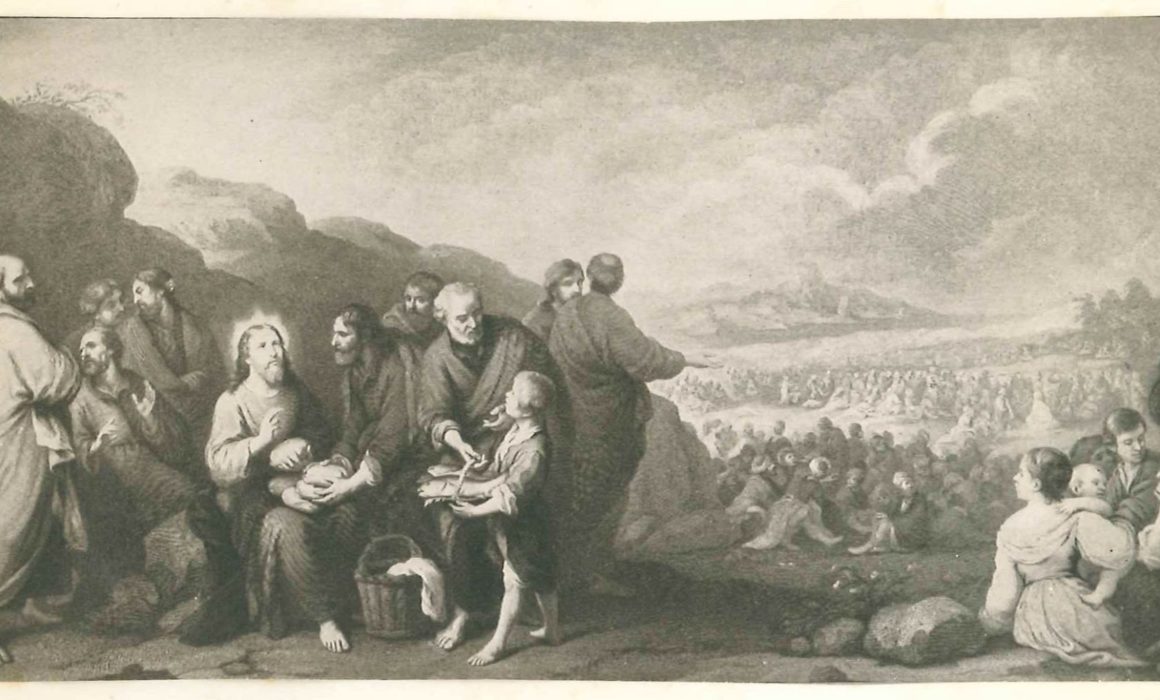Sermon for the Ninth Sunday after Pentecost
‘Now, when Jesus heard this, he withdrew from there, to a desolate place.’
+INJ+
The Lord Our God has gone. To a wasted land He has hidden Himself. He is not retreating. He is merely doing in time, in this mortal life, what He chose before all time to do from eternity. He has left the good land. Now he dwells in a desolate place. And behold, crowds followed him on foot. For this world to which He has come from the heavenly kingdom, this wasteland, is filled with crowds, for it was commanded of Adam, be fruitful and multiply.
Now the Christ looks upon the masses, five thousand, in this desert. Compassion He has for them, for He is love. The disciples ask Him to send the peoples away, for there is no food to be found, for there is nothing but five loaves and two fish.
But Our Lord rebukes the disciples. ‘They need not go away, you give them something to eat.’
What shall they eat? These five thousand? They shall feast on every word that comes forth from the mouth of God. For man shall not live on bread alone.
Let them feast on five loaves, for these are the five books of Moses, the Law of God; His perfect will; His everlasting covenant.
Let them eat the one fish of prophesy, that promises the salvation of the Lord, and let them devoir the one fish of the Gospel, which fulfills. For upon these two fish, born of holy water, the redemption of the world is written.
The disciples do not understand, for how can so little feed so many? The Lord has mercy on their foolishness, and commands ‘Bring them here to me.’ The crowds are ordered to sit down in the grass, and taking up the five loaves, he looked up to heaven, and said a blessing, then he broke the loaves and gave them to the disciples.
It is good that the masses lay upon the grass, for it is written that ‘he shall make me to lie down upon green pastures.’ And it is good that the Lord break the loaves, for it is written, ‘you lay me into the dust of death.’
For Christ tells us, ‘I am the bread of life.’ And this bread of life must be broken, forever broken, age upon age, generation upon generation. His blood must forever be shed, His side eternally slaughtered, that the five thousand, those born of the manifold wisdom of the five books of Moses, may be fed, for a thousand generations. Indeed, the five books of Moses must be broken, they must be cut, for no covenant is accomplished without it first being cleaved apart, ‘for without the shedding of blood, there is no atonement.’
I saw the bread of life broken. I have seem Him cleaved. On a cross, did I see Him, in every house of God, scattered across the earth, in grand cathedrals born of stone, in humble shacks bred of poverty; there have I seen the cross; And upon it, the Bread of Life, broken, speaking this blessing, ‘forgive them Father.’
My Father and Your Father has heard this blessing. For the Father, who is God over all, hears His Son. Now from every altar, a table before the enemy, is the Christ, the Bread of Life, My Lord and My God, broken, that the disciples, we miserable priests, might give Him to the crowds; to the Church, the masses, huddled in the wasteland.
Twelve baskets [full of broken pieces] remain, full of the [riven] flesh of the Crucified One, for this promise is to you and to your children. That it may be fulfilled what was written: ‘And they all ate, and were satisfied.’
‘Eat what is good, and delight yourself in rich food, for the Lord your God has glorified you.’
+INJ+
Preached by Pastor Fields
Sermon Texts: Isaiah 55:1-5; Romans 9:1-5; Matthew 14:13-21.



